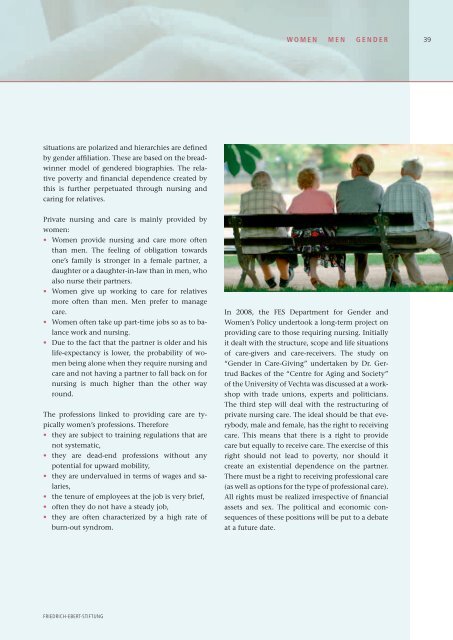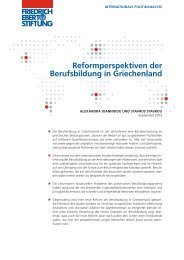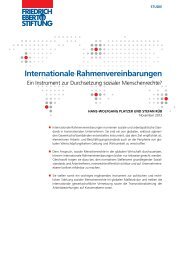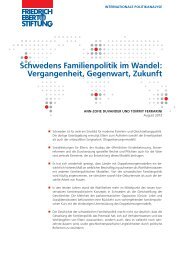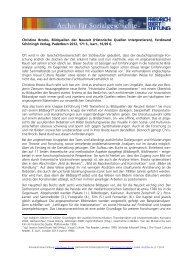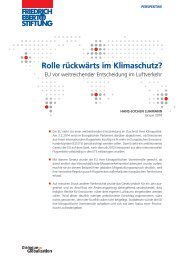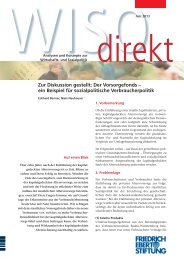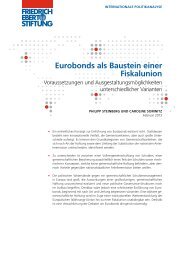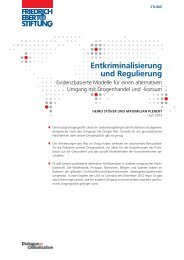Women - men - gender. - Bibliothek der Friedrich-Ebert-Stiftung
Women - men - gender. - Bibliothek der Friedrich-Ebert-Stiftung
Women - men - gender. - Bibliothek der Friedrich-Ebert-Stiftung
You also want an ePaper? Increase the reach of your titles
YUMPU automatically turns print PDFs into web optimized ePapers that Google loves.
situations are polarized and hierarchies are defi ned<br />
by <strong>gen<strong>der</strong></strong> affi liation. These are based on the breadwinner<br />
model of <strong>gen<strong>der</strong></strong>ed biographies. The relative<br />
poverty and fi nancial dependence created by<br />
this is further perpetuated through nursing and<br />
caring for relatives.<br />
Private nursing and care is mainly provided by<br />
wo<strong>men</strong>:<br />
<strong>Wo<strong>men</strong></strong> provide nursing and care more often<br />
than <strong>men</strong>. The feeling of obligation towards<br />
one’s family is stronger in a female partner, a<br />
daughter or a daughter-in-law than in <strong>men</strong>, who<br />
also nurse their partners.<br />
<strong>Wo<strong>men</strong></strong> give up working to care for relatives<br />
more often than <strong>men</strong>. Men prefer to manage<br />
care.<br />
<strong>Wo<strong>men</strong></strong> often take up part-time jobs so as to balance<br />
work and nursing.<br />
Due to the fact that the partner is ol<strong>der</strong> and his<br />
life-expectancy is lower, the probability of wo<strong>men</strong><br />
being alone when they require nursing and<br />
care and not having a partner to fall back on for<br />
nursing is much higher than the other way<br />
round.<br />
The professions linked to providing care are typically<br />
wo<strong>men</strong>’s professions. Therefore<br />
they are subject to training regulations that are<br />
not systematic,<br />
they are dead-end professions without any<br />
potential for upward mobility,<br />
they are un<strong>der</strong>valued in terms of wages and salaries,<br />
the tenure of employees at the job is very brief,<br />
often they do not have a steady job,<br />
they are often characterized by a high rate of<br />
burn-out syndrom.<br />
FRIEDRICH-EBERT-STIFTUNG<br />
WOMEN MEN GENDER<br />
In 2008, the FES Depart<strong>men</strong>t for Gen<strong>der</strong> and<br />
<strong>Wo<strong>men</strong></strong>’s Policy un<strong>der</strong>took a long-term project on<br />
providing care to those requiring nursing. Initially<br />
it dealt with the structure, scope and life situations<br />
of care-givers and care-receivers. The study on<br />
“ Gen<strong>der</strong> in Care-Giving” un<strong>der</strong>taken by Dr. Gertrud<br />
Backes of the “Centre for Aging and Society”<br />
of the University of Vechta was discussed at a workshop<br />
with trade unions, experts and politicians.<br />
The third step will deal with the restructuring of<br />
private nursing care. The ideal should be that everybody,<br />
male and female, has the right to receiving<br />
care. This means that there is a right to provide<br />
care but equally to receive care. The exercise of this<br />
right should not lead to poverty, nor should it<br />
create an existential dependence on the partner.<br />
There must be a right to receiving professional care<br />
(as well as options for the type of professional care).<br />
All rights must be realized irrespective of fi nancial<br />
assets and sex. The political and economic consequences<br />
of these positions will be put to a debate<br />
at a future date.<br />
39


